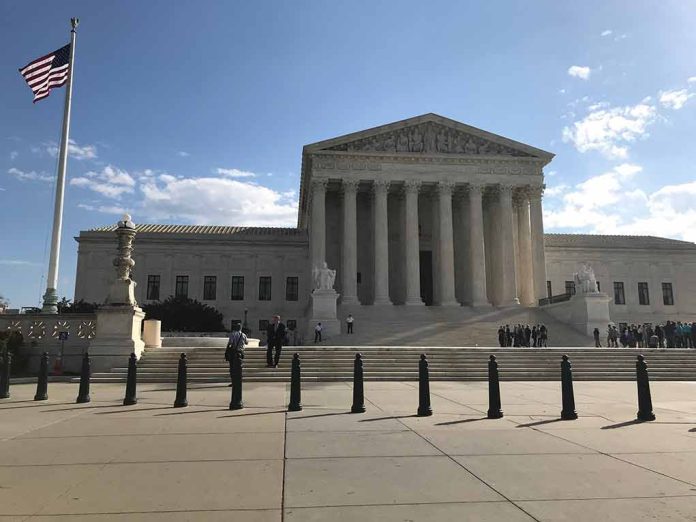
The Supreme Court declined to review New York’s concealed carry restrictions, leaving in place a controversial law that creates extensive “gun-free zones” and requires permit applicants to demonstrate “good moral character.”
Key Takeaways
- The Supreme Court’s decision upholds New York’s Concealed Carry Improvement Act, which designates sensitive locations like public transportation, hospitals, schools, and churches as gun-free zones.
- The law’s requirement that handgun license applicants demonstrate “good moral character” remains in effect, though the social media disclosure provision was struck down.
- New York implemented these restrictions after the Supreme Court’s 2022 Bruen decision invalidated the state’s century-old “proper cause” requirement for carrying firearms outside the home.
- In a separate decision, the Supreme Court upheld Biden administration regulations on “ghost guns,” expanding the definition of firearms to include partially completed frames and parts.
New York Concealed Carry Law Survives Supreme Court Review
Without explanation, the Supreme Court rejected a challenge to New York’s Concealed Carry Improvement Act, leaving intact significant portions of the law that restrict where firearms can be carried. The decision maintains an appeals court ruling that upheld bans on concealed firearms in “sensitive locations” such as public transportation, hospitals, schools, parks, entertainment venues, and other gathering places throughout New York City and the state. The law was passed in response to the Court’s 2022 Bruen decision, which struck down New York’s previous century-old restrictions requiring applicants to show “proper cause” for carrying handguns outside the home.
Governor Kathy Hochul celebrated the Supreme Court’s decision, stating, “New York’s strong gun safety laws save lives.” Her sentiment reflects the position of many Democratic lawmakers who have sought to maintain strict firearms regulations despite the Court’s recent expansion of Second Amendment protections. The appeals court’s October ruling remains in effect, which allows New York to enforce its “good moral character” requirement for handgun owners while striking down other provisions, including the requirement for applicants to disclose social media accounts and the provision making it a crime to carry concealed firearms on private property without explicit owner consent.
WASHINGTON: The Supreme Court declined to hear a challenge to New York’s gun law, leaving in place restrictions on concealed carry in “sensitive locations” like public transit, parks, hospitals, schools, houses of worship, and entertainment venues. pic.twitter.com/tCFLfXCIV0
— KolHaolam (@KolHaolam) April 8, 2025
Gun Rights Advocates Express Disappointment
Second Amendment advocates expressed frustration with the Court’s refusal to hear the challenge. Erich Pratt of Gun Owners of America expressed his disappointment, saying, “While we are disappointed by the Supreme Court’s decision not to take this case, we will never stop fighting to defend the rights of gun owners across the country.” The petitioners had argued that New York’s Concealed Carry Improvement Act violated constitutional rights by creating extensive restrictions that effectively prevent law-abiding citizens from exercising their right to bear arms in public spaces. The Court’s decision not to hear the case leaves significant questions unresolved about the limits states can place on concealed carry rights following the landmark Bruen ruling.
The Concealed Carry Improvement Act also requires applicants to provide character references and family contact information before receiving a concealed carry permit. This stands in contrast to the Court’s direction in the 2022 Bruen decision, where Chief Justice John Roberts and Justice Brett Kavanaugh wrote that states could impose licensing requirements but needed to avoid granting “open-ended discretion to licensing officials.” Critics contend that the “good moral character” requirement creates exactly this type of subjective standard that the Court previously found problematic.
Supreme Court Upholds “Ghost Gun” Regulations
In a separate but related decision, the Supreme Court upheld Biden administration regulations on so-called “ghost guns” in the case Garland v. VanDerStok. This ruling maintains ATF Final Rule 2021-05F, which expanded the definition of “firearm” to include partially completed pistol frames and other gun parts sold in kits. The regulation was designed to address the growing concern over untraceable firearms assembled from parts purchased without background checks. Unlike with the New York concealed carry case, the Court was willing to directly address this federal regulation, showing its selective approach to which Second Amendment challenges it chooses to hear.
The Supreme Court’s decisions on both the New York concealed carry law and ghost gun regulations demonstrate its evolving approach to Second Amendment jurisprudence. While the 2022 Bruen decision represented a significant expansion of gun rights by establishing a new historical tradition test for firearms regulations, subsequent rulings have shown the Court’s willingness to allow certain restrictions to remain in place. This has created a complex legal landscape where states like New York continue to implement strict gun control measures while navigating the constitutional boundaries established by the Supreme Court’s precedents.
Sources:
Supreme Court declines to hear challenge to New York’s ban on guns in ‘sensitive’ locations
Supreme Court won’t hear challenge to New York’s ‘sensitive locations’ gun control law
SCOTUS Declines Challenge to New York Concealed Carry Restrictions







